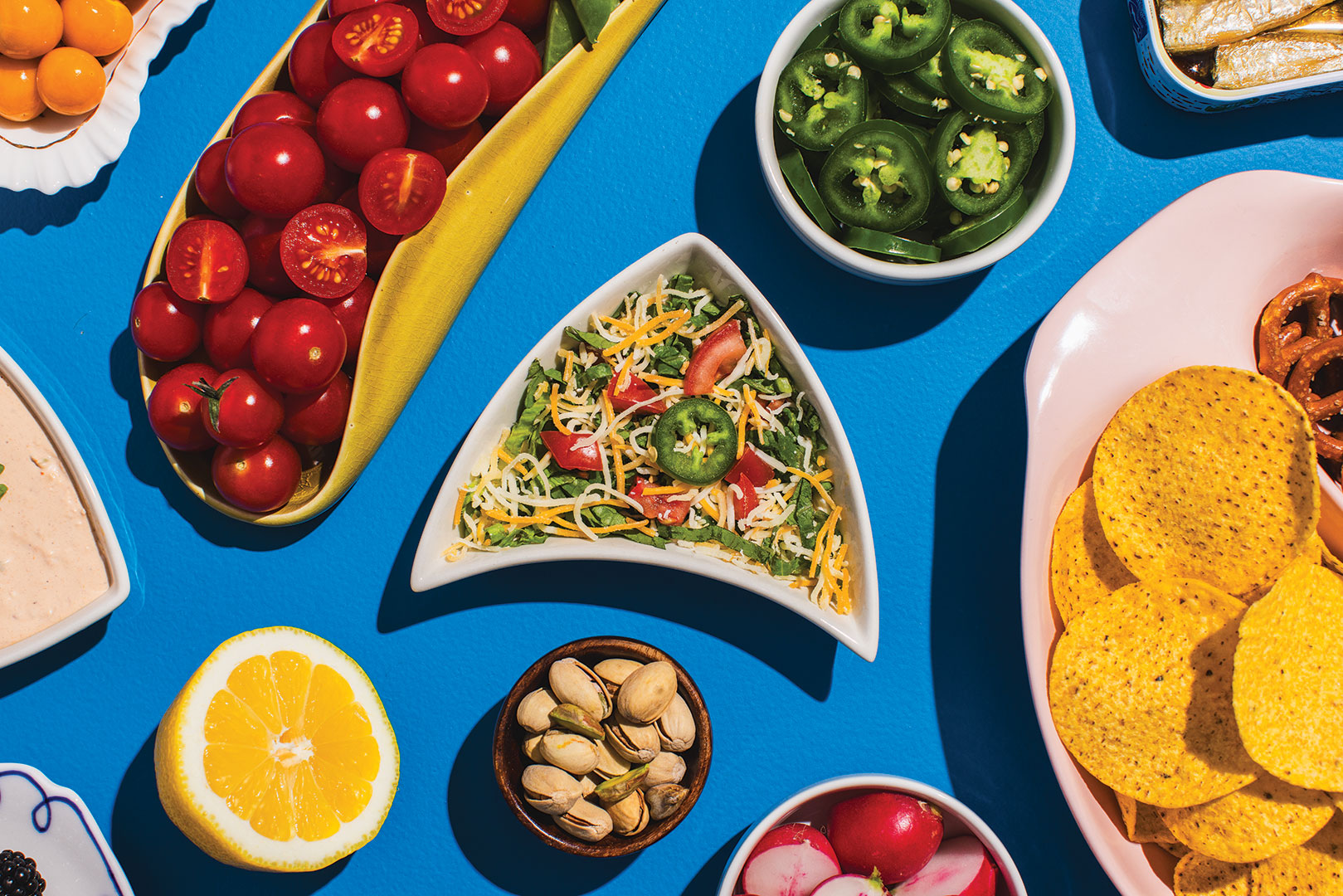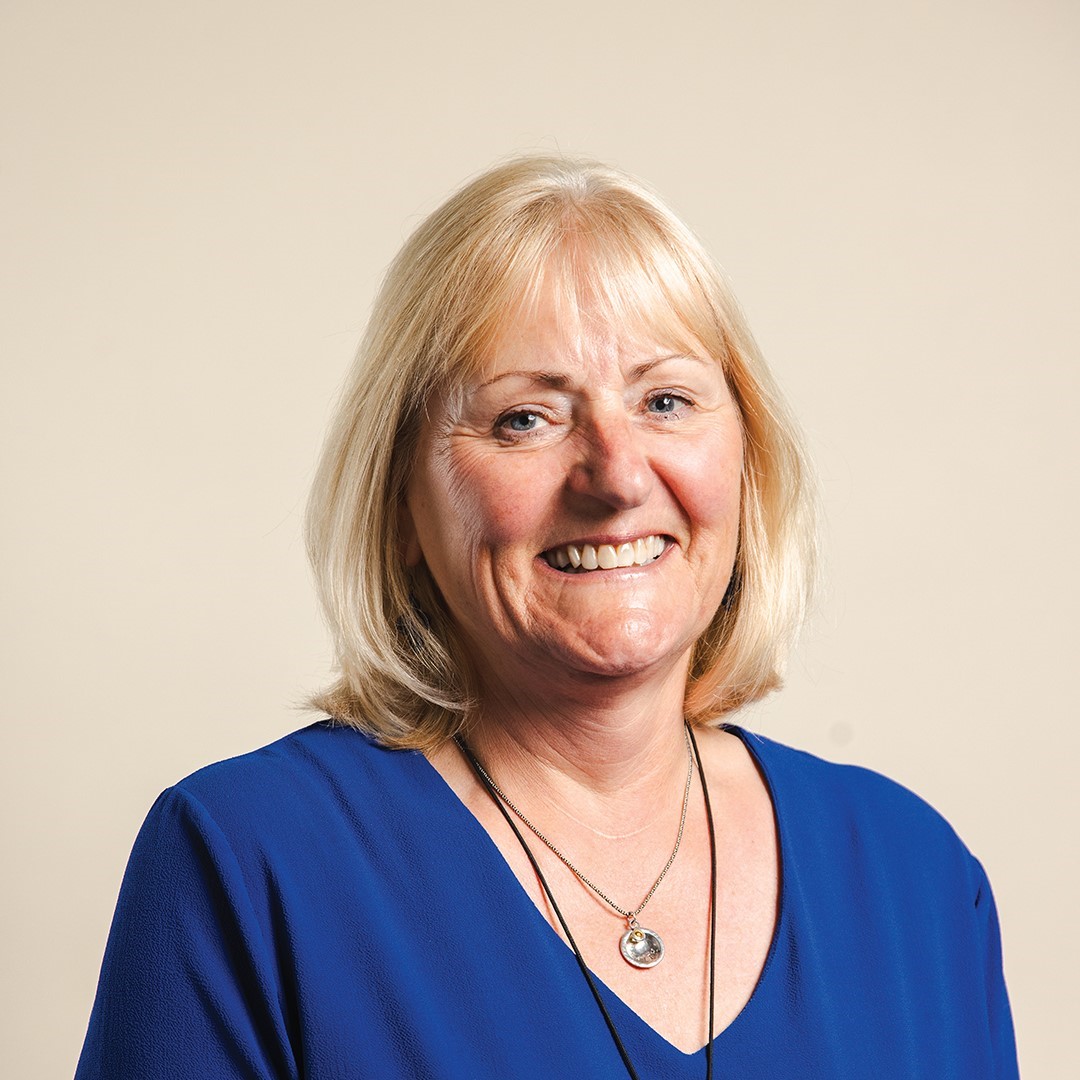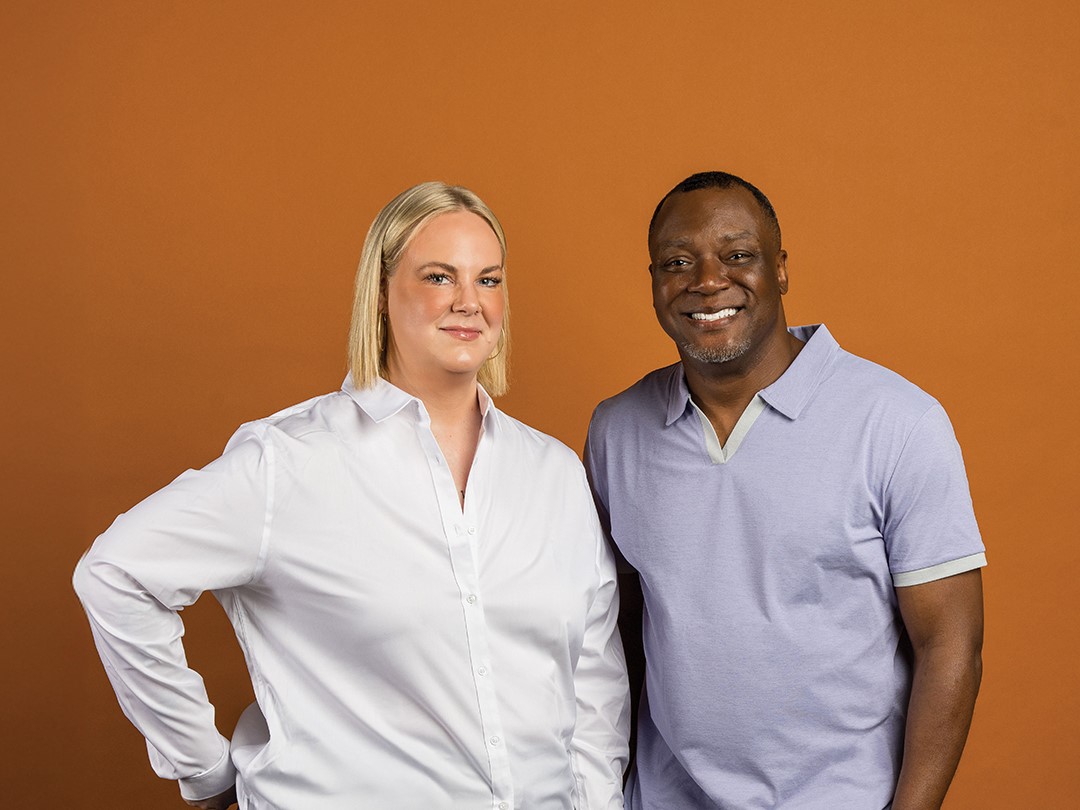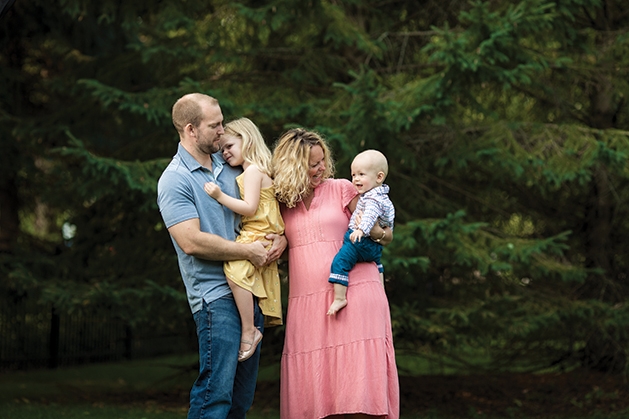
In light of Breast Cancer Awareness Month, we share the stories of three mothers who overcame one of life’s biggest challenges.
Three young mothers in Woodbury, all diagnosed with the most aggressive type of breast cancer, will mark their individual anniversaries this year for completing treatment for triple-negative breast cancer.
The rare form of cancer unexpectedly brought Charissa Bates, Mindy Maday and Ashley Wolf together to share their experiences—many of which are hard for others to understand. Despite their hardships, these women have made a connection that will last a lifetime.
“Everyone hears breast cancer and thinks it’s an easy surgery and done, but this [cancer] typically means the most aggressive chemotherapy is used with two other types of intravenous (IV) chemotherapy,” Bate says. She was only 33 years old when she was diagnosed with cancer in 2019. Her kids were only 2, 5 and 7 years old, and Bates says she was challenged with the thought of “not making it at the end for my kids.” Being so young, Bates did what she had to do: begin treatment.
Depending on the person, Bates says standard chemotherapy includes 12 weeks of Taxol and doses of a drug called AC (Adriamycin and Cyclophosphamide) for six months. All three women call AC the “red devil” because it’s “bright red like Kool-Aid,” Wolf says. Bates says it’s the harshest form of chemotherapy out there. While these treatments are standard for most people that are diagnosed with triple-negative, Bates had a mutation in her BRCA1 gene that gave her a 45 percent chance of being diagnosed with ovarian cancer. Two weeks after she began chemotherapy, Bates had a hysterectomy. “I don’t want cancer again, I didn’t want to deal with that,” Bates says. Two weeks later, and four weeks after beginning chemotherapy, she had a double mastectomy.
Only a few days before Christmas in 2019, Bates found out that there was residual cancer remaining. “I thought that I was going to die,” Bates says. After speaking with her doctor, she ended up doing another six months of oral chemotherapy, but Bates says she did not respond well. She received a lot of help from her family, friends and neighbors, as she was unable to get out of bed. “I always say I have the best neighbors in Woodbury because all my neighbors and friends fed me for a whole year,” Bates says. Her neighbors did a meal train for an entire year so her family could get hot meals. In addition to the hot meals, they also set up a GoFundMe page, which allowed Bates, a full-time stay-at-home mom, to a hire a nanny for all she needed. “Everyone made sure I could focus on my health without worrying about everything else,” she says.
At the age of 33, Bates would hear of “success stories” of people in their 50s and 60s that survived breast cancer, but this was “extremely unrelatable” to her because no one had heard of triple-negative. “I knew that I got the ‘bad’ cancer,” Bates says. She found it difficult hearing that people survived because, “I thought, ‘They don’t have what I have and they’re not the age that I am,” she says, noting her doctor said it wasn’t to her advantage that she had gotten cancer at a young age. Despite feeling alone in the beginning, Bates found a group on Facebook called The Young Survival Coalition, a nonprofit organization that focuses on women ages 40 and under who are diagnosed with breast cancer. She connected with them online, but was unable to connect in-person with the Minnetonka-based group because she was “too tired and too sick to drive there,” she says.
So, she started her own support group in Woodbury that meets every other month to connect. “It’s nice to know that you’re not alone. It’s nice to see people at different stages, too,” Bates says. Besides the group meetings, Bates made another connection with Wolf through a mutual friend. Bates says Wolf messaged that mutual friend and told her that she also had triple-negative breast cancer. Wolf invited Bates to her house and when she arrived, she says, “Ashley [Wolf] opens the door, she is completely bald … She’s smiling, and she answered the door with her 1-year-old and she tells me how she handled everything … Instantly, just connecting with Ashley, made me feel like I can do this, I can get through this.” After meeting with Wolf, she suddenly had hope.
Like Bates, Wolf too was in her early 30s when she was diagnosed with triple-negative in December 2018 when her daughter Emery was 11 months old. Before her diagnosis, Wolf thought she had mastitis from breastfeeding, so cancer wasn’t on her mind. “Not even thinking I was going to get cancer, it came back as triple-negative,” Wolf says. The disease, which is the most aggressive form of breast cancer, is also a grade three—meaning it’s the fastest growing. After her diagnosis, the only thing on Wolf’s mind was to have more children.
Wolf’s oncologist told her that it was possible the chemotherapy wouldn’t completely ruin her reproductive system. So, Wolf and her husband jumped right into fertility treatments, uncovered by medical insurance. “The insurance company told me because I’m choosing to have chemotherapy, which is the drug that’s ruining my reproductive system, that’s why they would not cover it,” Wolf says. At the end of 2018, she and her husband harvested her eggs, did in vitro fertilization (IVF) and had egg retrieval surgery. The couple didn’t implant the eggs, because she began cancer treatment instead. Wolf says she experienced one of her most heartbreaking moments when she was sitting planning her daughter’s birthday party during Christmas, thinking it might be the first and last birthday she would plan.
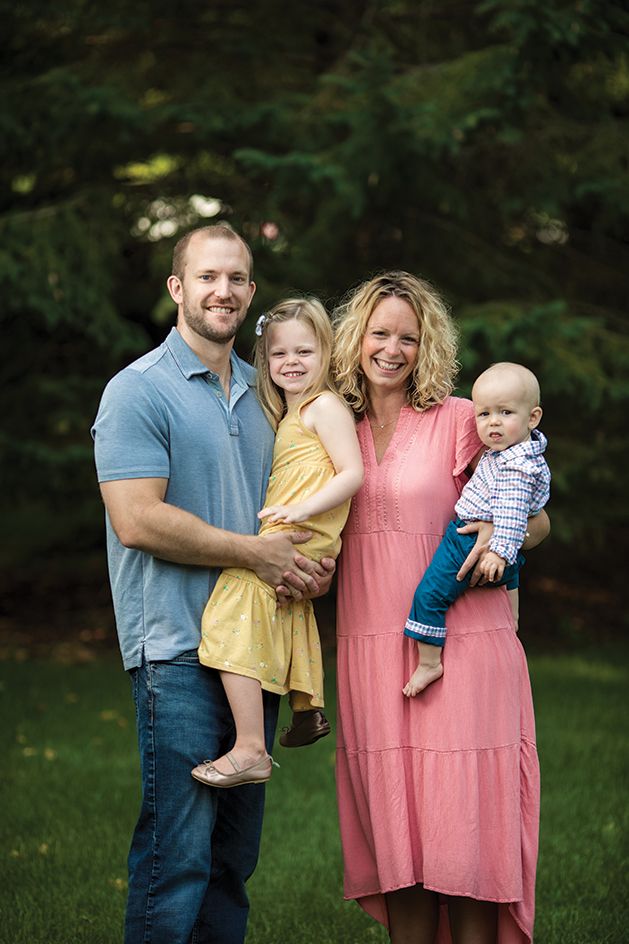
The same month, Wolf was accepted into a trial through Rochester’s Mayo Clinic, where she was given treatment typically used for lung cancer. In addition to the trial, Wolf completed 12 weekly Taxol treatments, along with other drugs like AC, describing treatments as “horrific,” because you lose your hair and get neuropathy in your arms, fingers and toes. Following treatments, Wolf also had a double mastectomy. “Just knowing that you’re losing a part of the women’s body that makes you feel feminine was pretty rough,” Wolf says.
However, because of COVID-19 and “luck” canceling one of her reconstruction surgeries, Wolf became naturally pregnant with her son, Ethan. “He’s our miracle baby,” Wolf says. “My daughter is my hero–she found the breast cancer for me and gives me a reason to fight every single day. Now, I have Ethan who we didn’t think we would ever see.” Her kids help keep cancer-related thoughts out of her mind, including the looming thought of the cancer returning.
Wolf was nearing the end of her treatment when Bates, who was just getting started on her treatment, came to her house. Through Bates’ Facebook group, Wolf met Maday. A day before Maday was diagnosed in October 2020*, she saw a post on the Woodbury neighborhood page about Bates’ support group. Two days later, Bates came over to Maday’s house and talked to her about cancer and what treatment was going to look like. “She scared the crap out of me,” Maday says. Looking back, Maday says she is glad that Bates shared her experience, because it prepared her for what was going to happen to her.
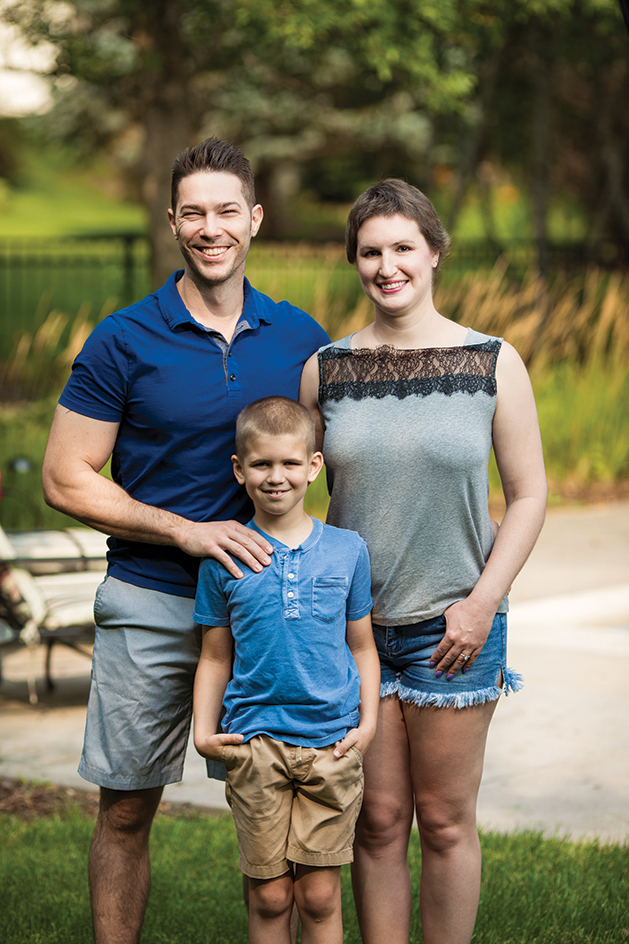
The following month, Maday started AC chemo for eight weeks. All the while, Maday had a 7-year-old son at home who was doing online school because of the pandemic. Between her parents and finance, they helped take care of her during treatment and her son. Bates set up a GoFundMe page and meal trains for Maday since she and her fiancé had just bought a home, and Maday was self-employed. Maday describes herself as being “so weak” to the point of not being able to cook anything for her son.
“When I was first diagnosed, I thought I was going to die,” Maday says. After a couple of weeks, she prepared herself for a conversation with her son. After one of his hockey practices, Maday talked with her son while he was playing in the bathtub. “I just took that time when he was relaxed to tell him that I was sick,” Maday says. She told him that the doctors were going to give her medicine that was going to make her sick. “And then I told him the medicine is going to make my hair fall out and that caught his attention,” Maday says. While she was bedridden, Maday says her son would sit beside her in bed and do his schooling right next to her.
Connecting with others was something Maday didn’t have a chance to do because of the pandemic. Especially when she had to go by herself to the clinic for treatment. “I had to everything by myself,” Maday says. “I approached it like a job that I didn’t want to do.” Similarly, shaving her head was something that Maday also didn’t want to do right away. She was told it was easier to shave her head before treatment so she wouldn’t have to watch her hair fall out, but “it was too hard,” she says. Maday ended up going to her stylist’s house to cut her hair to a bob, and as time went by, her hair began to fall out. “It was really hard to watch it fall out,” Maday says, noting this was one of the worst parts. Like Bates and Wolf, she had Taxol chemo for 12 weeks and had her last treatment on April 7th, 2021, followed by her mastectomy in May 2021.
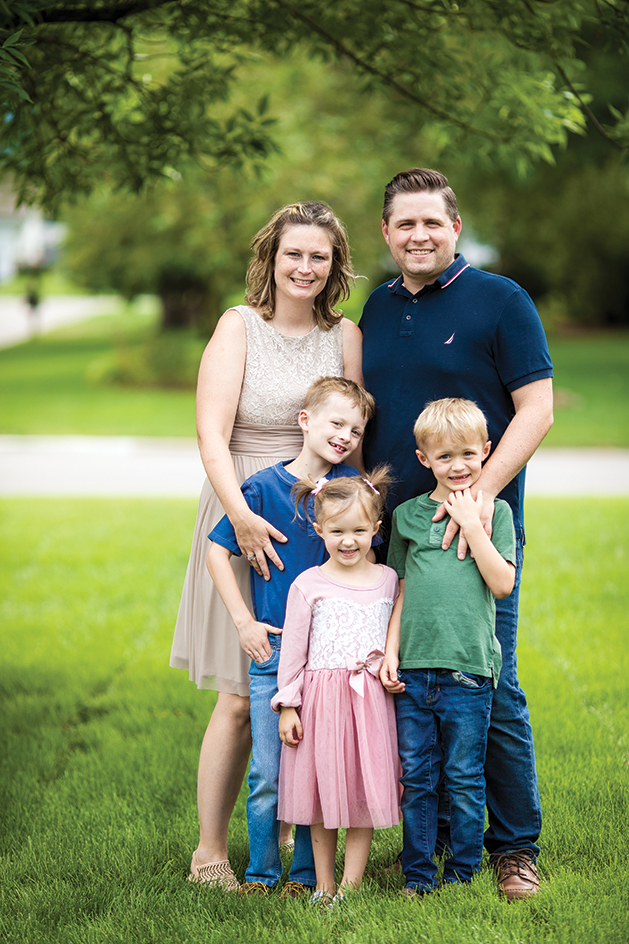
When all three women were asked what they would like to share with people who have experienced breast cancer, they shared similar responses of people lacking the emotional understanding and the severity of the disease. “I don’t think people understand how much cancer sucks [to have],” Maday says. She says it was hard to hear people say “you’re going to be fine” when you’re the one diagnosed with one of the rarest form of cancer. But, given all their odds, Bates, Maday and Wolf are all currently in remission. This month, Maday is celebrating one year since diagnosis and coming this December, Wolf will celebrate being three years out from her diagnosis. “To have someone who has been through it and has called to all those emotions, you can’t even put words how special that is,” Wolf says.
If you or someone you know is diagnosed with triple-negative breast cancer, join Bates’ Facebook group: MN Young Survival Coalition.
*Editor’s Note: Maday first discovered cancer via a self-exam. She notes that her cancer did not show up on a mammogram and stresses that self-exams are often the key to early detection.









